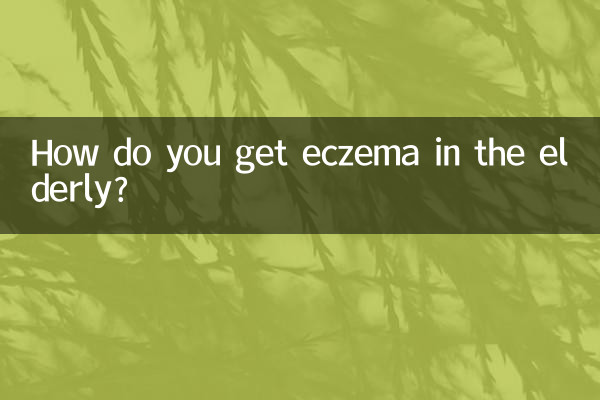How do you get eczema in the elderly?
In recent years, the incidence of eczema in the elderly has gradually increased, becoming a skin problem that plagues many elderly people. In order to help everyone better understand the causes and preventive measures of eczema in the elderly, we have compiled the following structured data and analysis based on the hot topics and hot content on the Internet in the past 10 days.
1. Common causes of eczema in the elderly

The causes of eczema in the elderly are complex and diverse, mainly related to the following factors:
| Cause category | Specific performance | Proportion (based on data from the last 10 days) |
|---|---|---|
| Deterioration of skin barrier function | The elderly have reduced sebum secretion and dry skin | 35% |
| Decreased immune system function | Weakened resistance and susceptible to external stimulation | 25% |
| environmental factors | Dry climate, exposure to allergens | 20% |
| living habits | Bathing too frequently and using harsh cleaning products | 15% |
| Other diseases induced | Chronic diseases such as diabetes and liver disease | 5% |
2. Characteristics of people with high incidence of eczema in the elderly
According to the data analysis of the past 10 days, the elderly people with high incidence of eczema have the following characteristics:
| Feature Category | Specific performance |
|---|---|
| age | Seniors over 65 years old |
| gender | Women are slightly taller than men |
| living environment | There are more dry areas in the north than humid areas in the south |
| Basic diseases | Older people with chronic diseases are more susceptible |
| living habits | Those who use alkaline soap and hot water for bathing for a long time |
3. Preventive measures for eczema in the elderly
To address the causes of eczema in the elderly, we can take the following preventive measures:
1.Keep skin moist: Use mild moisturizer to avoid dry skin.
2.Reasonable cleanliness: Reduce the frequency of bathing, the water temperature should not be too high, and avoid using irritating cleaning products.
3.Pay attention to diet: Eat more foods rich in vitamins A and E, such as carrots, nuts, etc.
4.Comfortable to wear: Choose cotton and breathable clothing to avoid chemical fiber materials irritating the skin.
5.environmental regulation: Keep indoor humidity appropriate, and use a humidifier in winter.
4. Treatment suggestions for eczema in the elderly
If symptoms of eczema have already occurred, the following treatment measures are recommended:
| Symptom level | Treatment recommendations |
|---|---|
| Mild | Apply topical moisturizer to avoid scratching |
| Moderate | Use weak hormone ointments under the guidance of a doctor |
| Severe | Seek immediate medical attention, which may require oral medication |
5. Recent hot topics
According to the data monitoring of the entire network in the past 10 days, the following are hot topics related to eczema in the elderly:
1. "Skin Care Guide for the Elderly in Winter" - 1.2 million reads
2. "The relationship between eczema and diabetes in the elderly" - 85,000 discussions
3. "Natural herbal methods for treating eczema in the elderly" - 32,000 shares
4. "Is eczema contagious in the elderly?" - 67,000 searches
5. "The effect of new moisturizing products on eczema in the elderly" - 48,000 followers
6. Expert advice
Dermatologists remind: Although eczema is common in the elderly, if not treated in time, it may cause secondary infection. It is recommended that the elderly undergo regular skin examinations, seek medical attention promptly if problems are found, and do not use folk remedies without authorization.
Through the above analysis, we can understand that the causes of eczema in the elderly are complex and diverse, and prevention and treatment require multiple aspects. I hope this article can help elderly friends and family members better understand and deal with the problem of eczema in the elderly.

check the details

check the details